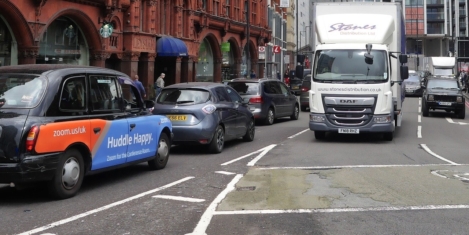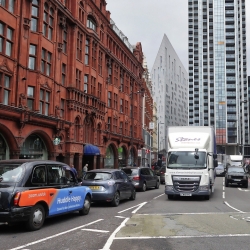To provide the best experiences, we use technologies like cookies to store and/or access device information. Consenting to these technologies will allow us to process data such as browsing behaviour or unique IDs on this site. Not consenting or withdrawing consent, may adversely affect certain features and functions.
The technical storage or access is strictly necessary for the legitimate purpose of enabling the use of a specific service explicitly requested by the subscriber or user, or for the sole purpose of carrying out the transmission of a communication over an electronic communications network.
The technical storage or access is necessary for the legitimate purpose of storing preferences that are not requested by the subscriber or user.
The technical storage or access that is used exclusively for statistical purposes.
The technical storage or access that is used exclusively for anonymous statistical purposes. Without a subpoena, voluntary compliance on the part of your Internet Service Provider, or additional records from a third party, information stored or retrieved for this purpose alone cannot usually be used to identify you.
The technical storage or access is required to create user profiles to send advertising, or to track the user on a website or across several websites for similar marketing purposes.
 A problem shared may be a problem halved but, according to a new report, many UK office workers can’t discuss work with their nearest and dearest without them switching off. The survey by CWJobs claims couples are more likely to know the PIN to their partner’s phone (40 percent) or who their favourite band is (38 percent) than understand what they do for a living (30 percent). Three quarters of the workers surveyed said their spouse could not explain their job to another person. (more…)
A problem shared may be a problem halved but, according to a new report, many UK office workers can’t discuss work with their nearest and dearest without them switching off. The survey by CWJobs claims couples are more likely to know the PIN to their partner’s phone (40 percent) or who their favourite band is (38 percent) than understand what they do for a living (30 percent). Three quarters of the workers surveyed said their spouse could not explain their job to another person. (more…)






 Nearly six in 10 British workers (58 percent) worry about disappointing their manager, with more than a third (36 percent) saying they rely on praise from their boss to help boost their confidence at work, a survey has claimed.
Nearly six in 10 British workers (58 percent) worry about disappointing their manager, with more than a third (36 percent) saying they rely on praise from their boss to help boost their confidence at work, a survey has claimed. 
 More than 40 percent of workers have a hidden health issue they’ve never disclosed to their employers, with younger employees the most likely to withhold information from their bosses, according to new research. A survey of 1,000 employees, carried out by healthcare provider
More than 40 percent of workers have a hidden health issue they’ve never disclosed to their employers, with younger employees the most likely to withhold information from their bosses, according to new research. A survey of 1,000 employees, carried out by healthcare provider 
 The UK’s ‘alternative workers’, comprising gig economy workers, freelancers and contractors, have cited lack of pay, benefits and job security as their most significant concerns in new research. Yet according to
The UK’s ‘alternative workers’, comprising gig economy workers, freelancers and contractors, have cited lack of pay, benefits and job security as their most significant concerns in new research. Yet according to 
 Outdoor workers in the capital are exposed to 15 percent more pollution than the average Londoner, new
Outdoor workers in the capital are exposed to 15 percent more pollution than the average Londoner, new 
 Policy makers should resist claims by Uber that its drivers fall into a middle ground between traditional employees and independent contractors, a new study says. The research report,
Policy makers should resist claims by Uber that its drivers fall into a middle ground between traditional employees and independent contractors, a new study says. The research report, 


 Policy makers should beware of classifying all gig economy workers as “employees”, a new research report has claimed. Such workers vary in age, income and education in a similar way to the traditional workforce and crafting regulations that treat both fully committed and occasional gig workers as one group is unlikely to be an efficient solution, the
Policy makers should beware of classifying all gig economy workers as “employees”, a new research report has claimed. Such workers vary in age, income and education in a similar way to the traditional workforce and crafting regulations that treat both fully committed and occasional gig workers as one group is unlikely to be an efficient solution, the 
 Four in 10 workers around the world are concerned about their health but don’t want to go to the doctor, a new research report has claimed. Although 40% of workers said they are worried about their long-term health, the same number hadn’t had a health check in the last year and most have no idea about basic indicators such as what their cholesterol level or body fat is. Inflexible and long working hours are compounding the problem, the report by
Four in 10 workers around the world are concerned about their health but don’t want to go to the doctor, a new research report has claimed. Although 40% of workers said they are worried about their long-term health, the same number hadn’t had a health check in the last year and most have no idea about basic indicators such as what their cholesterol level or body fat is. Inflexible and long working hours are compounding the problem, the report by 
 Data entry is the world’s most hated office technology task, with workers wasting about 40 percent of their day on this and other ‘digital admin’, a study has claimed. In a survey of 10,500 office workers spanning 11 countries, respondents said they average more than three hours a day on manual, repetitive computer tasks which aren’t part of their primary job and are ripe for human error.
Data entry is the world’s most hated office technology task, with workers wasting about 40 percent of their day on this and other ‘digital admin’, a study has claimed. In a survey of 10,500 office workers spanning 11 countries, respondents said they average more than three hours a day on manual, repetitive computer tasks which aren’t part of their primary job and are ripe for human error. 










